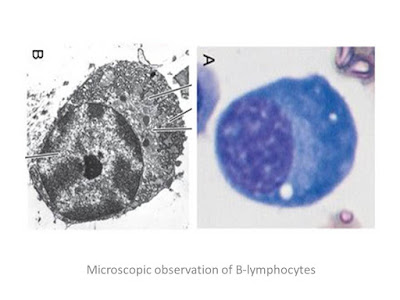What is B-lymphocytes (B-cells)?
B-cells have characteristic big nuclei, with large
endoplasmic reticulum and numerous ribosomes. These features reflect their
active transcriptional state (they produce large amounts of antibodies).
Molecular basis of
antigen recognition by antibodies
Similarly to antigens recognized by T-cells, epitopes
recognized by B-cells are millions (but less than that of T-cells). And, they don’t
have limitations. Such as-
- Can be linear peptides of folded peptides
- Can also be polysaccharides, lipids, nuclei acids and small chemical molecules
- Can be on cells or soluble
- Do not need to be presented by MHC molecules
All the antibodies (also called immunoglobulins, Ig) have a
similar structure, but they display an enormous variability in the antigens that
they can recognize. Unlike T-cell epitopes, B-cell epitopes (generally called
determinants) can be linear or conformational (3D).





No comments